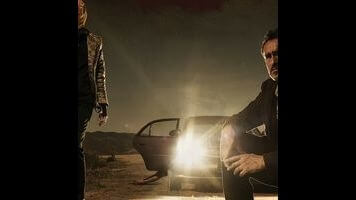Yet, I still craved momentum when it came to The Beast. Focusing on the world of the show did not subvert the medium enough, only because I am still interested in what we little know about The Beast. What was interesting about The Wire was that the crime and bureaucracy of the crime world was so commonplace. The Beast's crimes are too unusual to be relegated to the background plot, his unknown motive too intriguing. While The Beast may not be the point of the series, it is when the show focuses on him that I want more. And wanting more, craving more, is what makes a great series. “Destino” left me wanting more, and I say that in the best possible way.
What’s interesting about potential Beast Jackson Childress is that I’m not at all sold on the fact that he’s our guy, if only because general structure tells the regular TV viewer that we still have almost half a season of plot to get through. But there’s also Sonya’s claim, that the man who committed these crimes is not insane as Childress clearly is, to take into consideration. Here’s a guy who must have technological savvy, insider knowledge, and an extreme sense of foresight. Even as a red herring, though, Childress upped the stakes of The Bridge’s central mystery, even if it puts the investigators in to another dead end. Even with a dead end, there are lives on the line. It also allowed for fantastic performances from the entire team of investigators, giving Johnny Dowers’ Det. Tim Cooper a chance to do something other than act as support staff. Even Diane Kruger is growing on me as Sonya. It took me awhile to warm up to Kruger—not the character, as that’s an intentional distance—but as her character is forced to deal with emotions and situations that clearly throw her off her game, Kruger is really coming into her own. The final shot of Kruger gripping her neck, emulating the lack of breath she experienced after she was shot, was gorgeous.
But an ostensible end to one plot (that, once again, I do not buy), opens up a flood of questions. It’s a grand coincidence that Manny Stokes was not able to share his dental-induced theories before having his head blown off (in full on gruesome detail), but it’s another clue that Childress isn’t our Beast. Why allow him to have a revelation if nothing was to come of it? It was the painting of the desert on the dentist’s wall that inspired him, mouth agape as he finally was relieved of his orthodontia. But what about the desert?
Manny Stokes’ orthodontist appointment was one of many particularly well shot scenes, not just in this episode, but in the entire series. I also particularly loved the shot of Graciela’s feet dangling from the window as Ray completes his part of the tunnel bargain, an act alone rife with sexual symbolism. Ray is given permission to run guns through Graciela’s (literal) tunnel, but only after she receives pleasure from the deal. That doesn’t bode well for Ray. Conversely, Charlotte wonders if she can trust Ray as he is supposedly giving her similar sexual satisfaction only to be lied to. She can’t. It’s a false sense of security. That doesn’t bode well for Charlotte. It’s interesting that Ray wants to run guns, rather than drugs, which is what I assumed his initial deal with Tampa Tim entailed, but it demonstrates the cyclical nature of the border. The cartels are fueled by guns, which in turn fuels the drugs trade.
Like Stokes, an appearance by Fausto Galvan becomes an episode highlight, and his part gives further insight into Linder. Clearly, Galvan was not happy with Linder's murder of his deputy, but he left Linder alive, allowing the loner to continue to act as coyote, this time for Fausto's girlfriend, Sara Vega. He's not successful this time around. Daniel Frye is not having much luck with his sobriety either, his body betraying him as he goes into withdrawal after he attempts to give the story fully over to Adriana. But maybe by extricating himself from his portion of the drug trade, he'll be able to report on it more fully.

 Keep scrolling for more great stories.
Keep scrolling for more great stories.
